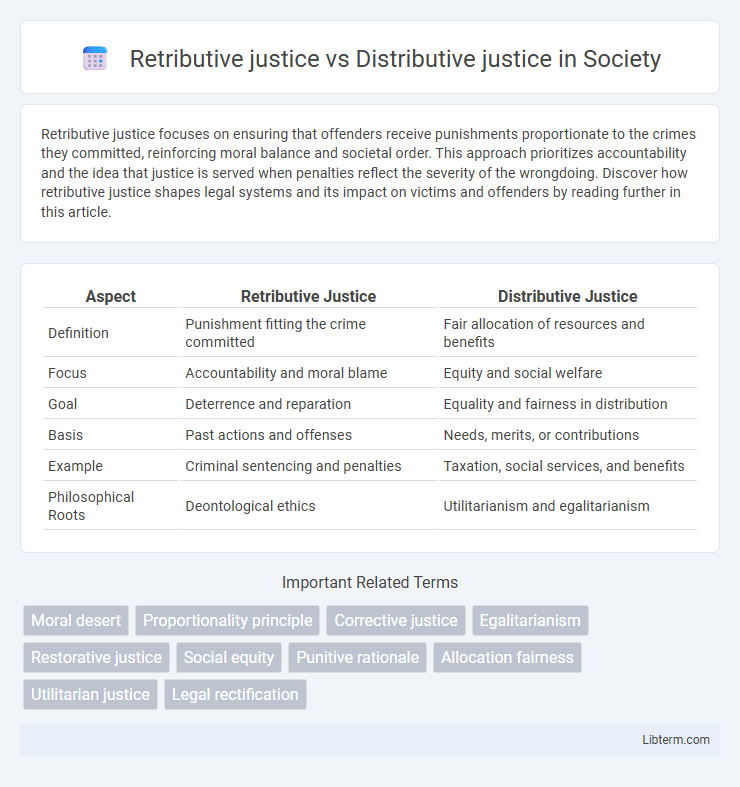Retributive justice focuses on ensuring that offenders receive punishments proportionate to the crimes they committed, reinforcing moral balance and societal order. This approach prioritizes accountability and the idea that justice is served when penalties reflect the severity of the wrongdoing. Discover how retributive justice shapes legal systems and its impact on victims and offenders by reading further in this article.
Table of Comparison
| Aspect | Retributive Justice | Distributive Justice |
|---|---|---|
| Definition | Punishment fitting the crime committed | Fair allocation of resources and benefits |
| Focus | Accountability and moral blame | Equity and social welfare |
| Goal | Deterrence and reparation | Equality and fairness in distribution |
| Basis | Past actions and offenses | Needs, merits, or contributions |
| Example | Criminal sentencing and penalties | Taxation, social services, and benefits |
| Philosophical Roots | Deontological ethics | Utilitarianism and egalitarianism |
Introduction to Retributive and Distributive Justice
Retributive justice centers on punishment proportionate to the offense, aiming to restore moral balance by holding offenders accountable, while distributive justice concerns the equitable allocation of resources and opportunities among individuals in society. Retributive justice is often applied in criminal law, emphasizing fairness through correct sentencing, whereas distributive justice is foundational in social policy, guiding fair distribution based on need, merit, or equality. These two concepts address justice from differing perspectives: the former focusing on rectifying wrongdoing and the latter on ensuring fairness across social and economic realms.
Defining Retributive Justice
Retributive justice is a theory of justice focused on punishment proportionate to the offense committed, aiming to restore moral balance by holding offenders accountable. It emphasizes the idea that punishments should be deserved and fitting the severity of the wrongdoing rather than serving social utility. Retributive justice contrasts with distributive justice, which concerns the fair allocation of resources and benefits within society.
Understanding Distributive Justice
Distributive justice focuses on the equitable allocation of resources, benefits, and burdens among individuals within a society, ensuring fairness based on criteria such as need, merit, or equality. It involves analyzing the principles that guide how wealth, opportunities, and privileges are distributed to promote social welfare and reduce disparities. Understanding distributive justice requires examining theories like egalitarianism, utilitarianism, and libertarianism, which offer different frameworks for determining just distribution.
Philosophical Foundations of Each Justice Model
Retributive justice is grounded in the principle of moral accountability, emphasizing punishment proportional to the wrongdoing to restore societal balance. Distributive justice is based on fairness in the allocation of resources, prioritizing equity and equality to achieve social welfare and protect individual rights. Philosophers like Immanuel Kant advocate retributive justice for maintaining moral order, while John Rawls emphasizes distributive justice to ensure fairness in social cooperation and the distribution of primary goods.
Key Differences Between Retributive and Distributive Justice
Retributive justice focuses on punishment proportional to the offense committed, emphasizing moral accountability and consequences for wrongdoing. Distributive justice centers on the fair allocation of resources and benefits across society, aiming to uphold equity and social welfare. Key differences lie in retributive justice addressing past actions and sanctions, while distributive justice prioritizes equitable distribution of goods and opportunities for all individuals.
Historical Perspectives on Justice Theories
Retributive justice, rooted in ancient legal systems such as Hammurabi's Code, emphasizes punishment proportionate to the offense to maintain social order. Distributive justice, heavily influenced by philosophers like Aristotle and later John Rawls, centers on the fair allocation of resources and benefits within society. Historical perspectives reveal a shift from prioritizing punishment for wrongdoing to ensuring equitable treatment and resource distribution among members of the community.
Practical Applications in Legal Systems
Retributive justice in legal systems prioritizes punishment proportional to the offense, ensuring offenders receive penalties that reflect the severity of their crimes. Distributive justice focuses on the equitable allocation of resources and benefits, influencing policies such as sentencing disparities and access to legal representation. Practical applications include sentencing guidelines that balance retribution with fairness and reforms aimed at reducing systemic inequalities in the justice process.
Criticisms and Limitations of Retributive Justice
Retributive justice faces criticisms for its emphasis on punishment rather than rehabilitation, often neglecting the social and economic factors contributing to criminal behavior. This approach can perpetuate cycles of inequality by disproportionately impacting marginalized communities and failing to address underlying systemic issues. Its limitations include a rigid focus on proportionality that may overlook opportunities for restorative outcomes and fail to reduce recidivism effectively.
Criticisms and Limitations of Distributive Justice
Distributive justice often faces criticism for its challenges in achieving fair allocation of resources, as subjective notions of equity and need can lead to inconsistent outcomes. Critics argue that it can overlook individual merit and effort, potentially discouraging productivity and innovation. The theory's limitation in addressing complex social inequalities and context-specific circumstances reduces its practical effectiveness in diverse societies.
Contemporary Relevance and Future Directions
Retributive justice emphasizes punishment proportionate to offenses, maintaining societal order by holding individuals accountable, while distributive justice focuses on fair resource allocation to address social inequalities. Contemporary relevance highlights ongoing debates in criminal justice reform, with calls to balance retribution and rehabilitation, and in policy-making for equitable wealth distribution amid growing economic disparities. Future directions involve integrating restorative justice principles with distributive frameworks to promote social cohesion alongside accountability.
Retributive justice Infographic

 libterm.com
libterm.com